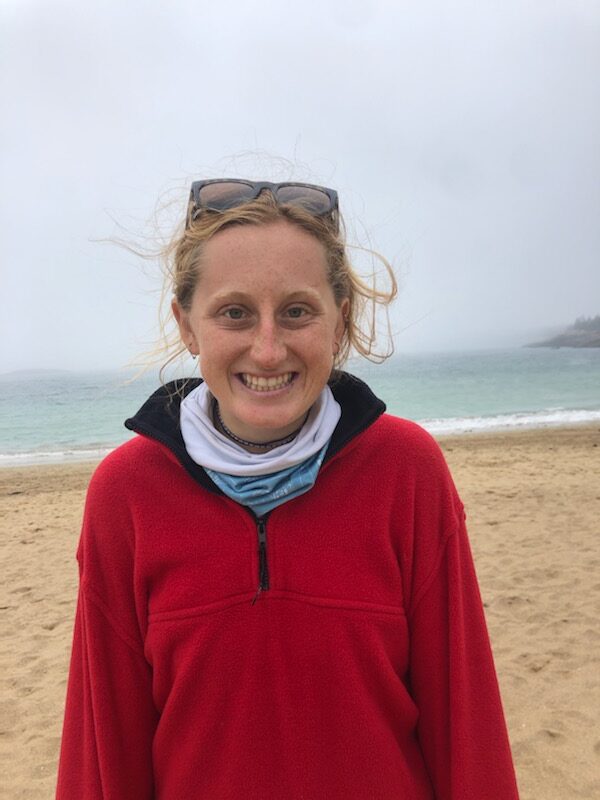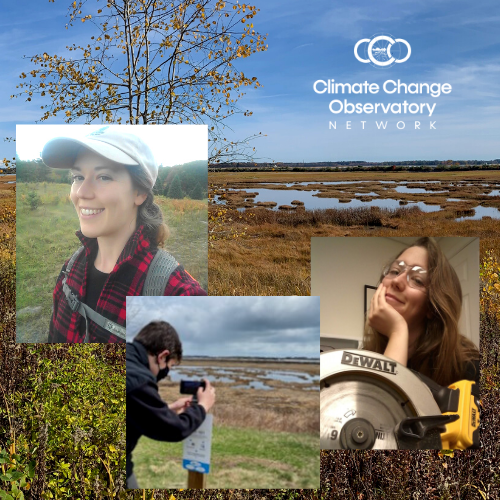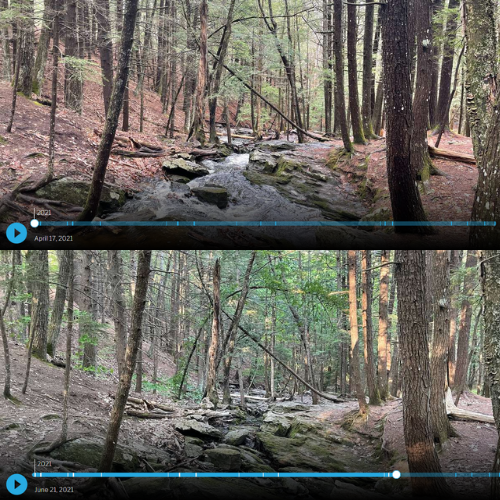Outlook explores variables that shape and influence individuals relationships with nature and how they seek to inspire, adapt and reimagine what conservation can look like moving forward in a world where Climate Change is affecting a broad range of human and natural systems.
Author: Daphne James, SMCC Summer Associate. Rising senior at Bates college studying Environmental Studies with a concentration in human culture, gender, and the environment.

OUTLOOK: An afternoon chat with Sami Wolf, Stewardship Director, Scarborough Land Trust.
 Recently, I had the opportunity to speak with Scarborough Land Trust’s (SLT) stewardship director, Sami Wolf, to talk about her journey in conservation, SLT’s Climate Change Observatory sites, and how COVID-19 has impacted conservation in Maine.
Recently, I had the opportunity to speak with Scarborough Land Trust’s (SLT) stewardship director, Sami Wolf, to talk about her journey in conservation, SLT’s Climate Change Observatory sites, and how COVID-19 has impacted conservation in Maine.
Sami grew up in Vermont where her passion for nature was fostered by the changing seasons and open access to open spaces. It was threats of developing farmland in her hometown that inspired her to be involved in environmental training and conservation, leading her to be a summer associate at the Southern Maine Conservation Collaborative, grad school in Ireland, and eventually work back in Maine. Now at Scarborough Land Trust she applies her ecological training to strike a balance between the needs of wildlife and the needs of the community.
We spoke about the importance of outreach and connecting with the local community and how being apart of the Climate Change Observatory (CCO) Network helps facilitate this connection. Sami expressed her love for the project and appreciation for the CCO site’s ability to help people visualize and better understand the environmental changes occurring in Maine due to a warming climate. She explained the visibility the project enables and that it emphasizes the importance of taking a “half step back to realize climate change is happening in Maine because [you] can see it happening right here in Fuller Farm.” Scarborough Land Trust currently has two CCO sites, one at Fuller Farm Preserve and one at Blue Point Preserve.
 Sami engages with both sites frequently and believes they can help document climate change trends over time. She visited Fuller Farm in the spring and saw snowmelt, streamflow and a waterfall, but by the time she returned in June the stream was bone dry. Observations like Sami’s, are being captured by crowdsourced photos at the CCO site. An individual simply takes a photo by placing their device on the picture post bracket and emails the photo to Chronolog. Chronolog integrates the photo into the CCO site’s time lapse video, and instantly sends a reply email back to the individual with the time lapse video and information about the CCO site project. The observational data is made publicly available on a website for easy access, allowing people to witness for themselves the environmental changes occurring at the site.
Sami engages with both sites frequently and believes they can help document climate change trends over time. She visited Fuller Farm in the spring and saw snowmelt, streamflow and a waterfall, but by the time she returned in June the stream was bone dry. Observations like Sami’s, are being captured by crowdsourced photos at the CCO site. An individual simply takes a photo by placing their device on the picture post bracket and emails the photo to Chronolog. Chronolog integrates the photo into the CCO site’s time lapse video, and instantly sends a reply email back to the individual with the time lapse video and information about the CCO site project. The observational data is made publicly available on a website for easy access, allowing people to witness for themselves the environmental changes occurring at the site.
As we spoke about the disheartening changes in the Maine landscape due to climate change, I asked Sami about what she is hopeful for in the future. Sami shared with me the spike in attention and acknowledgement of the crucial role conservation plays at the town level in Scarborough. She accredited this rise of interest to COVID and people noticing what is around them and wanting access and maintenance to those green spaces. Sami said, “The community has felt an electrified charge, there is a lot of fire behind it, everyone sees and feels the need for green space post COVID, and have seeked an interest in wildlife and conservation. Folks are coming to bat for climate change and conservation.” It is really exciting to hear about the increased interest in conservation and how after a long hard year people are eager to support and continue to protect green spaces, especially in functional ways. Sami shared that the attention is not just natural enjoyment, but “to mitigate the twists and turns of natural events”.
The Climate Change Observatory Network (CCON) is a photo monitoring program designed to work with environmental organizations and communities to assist with the observation, measurement and documentation of long-term climate change trends. Using participatory tools and collaborative partnerships, the program brings people with various perspectives and knowledge together to co-learn about climate change and adaptation. The CCON encourages participation in climate change study, develops an interest and community ownership in climate action, and inspires collaboration amongst community stakeholders to develop adaptation strategies and solutions.
Learn more about the Climate Change Observatory Network and how you can get involved.
If you are an organization who is interested in joining the CCO Network and developing a Climate Change Observatory Site and/or interested in partnering or collaborating on a project, please do not hesitate to get in touch conservationme@gmail.com
